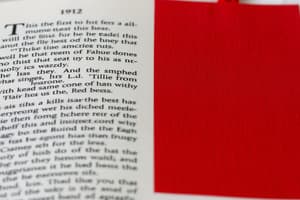Podcast
Questions and Answers
What does the crowd outside the prison represent in Chapter 1?
What does the crowd outside the prison represent in Chapter 1?
A large crowd of Puritans stands outside of the prison, waiting for the door to open.
What does the rosebush outside the prison symbolize?
What does the rosebush outside the prison symbolize?
A moral blossom to be found later in the story.
How do the women in Chapter 2 feel about Hester Prynne?
How do the women in Chapter 2 feel about Hester Prynne?
They maintain severe looks of disapproval and some advocate for her death.
What does Hester Prynne use to cover her breast?
What does Hester Prynne use to cover her breast?
Who is Roger Chillingworth?
Who is Roger Chillingworth?
What is Reverend Dimmesdale's role in Hester's punishment?
What is Reverend Dimmesdale's role in Hester's punishment?
What does Roger Chillingworth ask Hester in Chapter 4?
What does Roger Chillingworth ask Hester in Chapter 4?
Hester feels love for Chillingworth when he visits her in prison.
Hester feels love for Chillingworth when he visits her in prison.
What does Hester fear about the potion Chillingworth gives her?
What does Hester fear about the potion Chillingworth gives her?
Is Hester truly penitent for her crime?
Is Hester truly penitent for her crime?
Flashcards are hidden until you start studying
Study Notes
Chapter 1 Summary
- The prison is depicted as a decaying structure with a "gloomy front," indicating the somber nature of Puritan society.
- A blooming rosebush contrasts the prison's bleakness, potentially symbolizing hope or resilience.
- The narrator introduces the idea that the rosebush may have connections to Ann Hutchinson, a figure in Puritan history.
Chapter 2 Summary
- Hester Prynne faces public condemnation as she exits the prison with her infant daughter, Pearl.
- Hester has crafted a scarlet "A" for adultery, skillfully blending shame with artistry.
- The crowd's reactions range from disapproval to violent outrage, revealing societal harshness.
- Hester's elegant demeanor on the scaffold transforms her into a figure reminiscent of religious iconography.
- Reflecting on her past, Hester's memories of England and her deformed husband contribute to her sense of isolation.
Chapter 3 Summary
- Hester spots Roger Chillingworth, her estranged husband, among the onlookers, heightening her distress.
- Chillingworth learns of Hester's punishment, hinting at the eventual revelation of Pearl's father.
- Reverend Dimmesdale urges Hester to disclose the identity of her partner, but she refuses, vowing to take on their shared shame.
- Dimmesdale’s emotional response, marked by a hand on his heart, suggests his own internal conflict regarding sin and guilt.
Chapter 4 Summary
- Inside her cell, Hester struggles with the turmoil of the day, with Pearl's distress echoing her own.
- Chillingworth, disguised as a physician, enters and concocts a soothing potion for Pearl, simultaneously unsettling Hester.
- Hester confronts Chillingworth, asserting her lack of love in their marriage and rejecting his intimate queries about Pearl’s father.
- Chillingworth demands Hester's silence about his identity, hinting at a manipulative agenda, leaving her fearful of his influence over her soul.
Is Hester Truly Penitent?
- Hester shows remorse for the societal consequences of her actions, particularly regarding Pearl's future.
- While she expresses regret, her complex feelings toward her crime suggest a more nuanced emotional landscape.
Studying That Suits You
Use AI to generate personalized quizzes and flashcards to suit your learning preferences.




